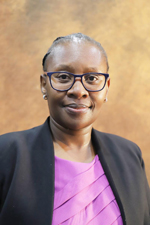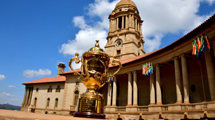 By Nomonde Mnukwa
By Nomonde Mnukwa
The record breaking fourth win of the Web Ellis Cup by the Springboks, and second consecutive win for our nation, brings hope to South Africans amidst our challenges and demonstrates the transformative power of sport that contributes towards building our national heritage.
Every sporting event we participate in is a representation of our national heritage. From the singing of our national anthem before the match, to the raising of our South African flag and commendable sportsmanship, our cultural diversity and unity is also on display.
Sport allows us to transcend our cultural, racial and linguistic differences. It gives us a sense of belonging and is the common unifier when we join together to support our nation. It fosters social cohesion, peace and development, contributing to creating our vibrant national heritage.
Our national and living heritage is transmitted through sports and cultural activities as well as our myriad of people, consisting of various ethnicities, cultures and traditions, making South Africa one of the most culturally diverse nations in the world.
Today, we celebrate our diversity and recognise how sport has contributed to uniting a nation that was once divided.
The potential of sport, as an instrument of change, was identified by our first democratic president Nelson Mandela. In a nation that was bitterly divided by apartheid, Mandela used the 1995 Rugby World Cup to foster a shared national pride and identity.
Madiba stated: “Sport has the power to change the world. It has the power to inspire. It has the power to unite people in a way that little else does. Sport can awaken hope where there was previously only despair. It is more powerful than governments in breaking down racial barriers.”
South Africans put aside their differences and united to celebrate South Africa as ‘one team’ and ‘one country’ when South Africa won the Rugby World Cup in 1995, over its arch-rival New Zealand and euphoria swept across the nation.
The match stands as a symbolic moment in our nation’s heritage, as it leapfrogged reconciliation and restoration of our new democracy which only began a year earlier with our first democratic elections.
Through our democracy, rugby became repositioned as a sport to help heal and unite our nation, as black South Africans became part of the sport which was once only reserved for whites. In 2019, and again this year, we proved our unity is strength as the Springboks triumphed, with the most racially diverse team thus far, led by our first black Captain, Siya Kolisi.
Another proud moment in our sporting heritage was when South Africa became the first African country to host the 2010 FIFA World Cup. This provided the platform to showcase our proudly South African heritage and spirit of Ubuntu, which inspires nations to adopt a culture of humanity and collectivism.
This year, the Proteas Cricket team also represented our country exceptionally well by making it through to the semi-finals of the Cricket World Cup. The spotlight also shone on our Spar Proteas netball team who played their hearts out at the Netball World Cup held in Cape Town.
Our sports women continued to make history when Banyana Banyana became the first senior South African team to advance beyond the group stages of the FIFA Women’s World Cup held in Australia and New Zealand this year. Our national women’s rugby team have participated in three Rugby World Cups since they debuted in 2006.
The involvement of women, in particular black South African women, in sport such as football and rugby affirms our transformed, inclusive and diverse heritage. Our inclusivity also extends to giving marginal groups, such as people with disabilities, who have flown the South African flag high in various sporting codes. During the 2023 Special Olympics World summer games, South African participants did us proud by bringing home two gold, seven bronze and 20 silver medals.
To round off our triumphs on the sporting field we also celebrate our men’s hockey team which made its fifth appearance in the International Hockey Federation (FIH) indoor Hockey World Cup held this year.
Our sporting milestones sparks hope, especially within historically disadvantaged communities, to work towards developing their lives and our national heritage. The Department of Sports, Arts and Culture offers internship opportunities and bursary programmes to youth who are financially challenged to pursue heritage related programmes. Government encourages our youth to grab these opportunities and calls on our communities to preserve our sporting heritage.
We can sustain our heritage by participating in sporting activities and indigenous games such as diketo and “morabaraba”. “Morabaraba” is a traditional board game derived from the Sesotho language, meaning to mill or go around in a circle, and is also played as a competitive sport in South Africa.
Participating in sport provides recreational activities for our youth, keeping them away from social ills and help build healthier communities that uphold our heritage. Let us keep our national heritage alive by supporting our sports teams and participating in sporting or cultural activities that continue to unite and transform our nation.
Nomonde Mnukwa is Acting Director General of GCIS





